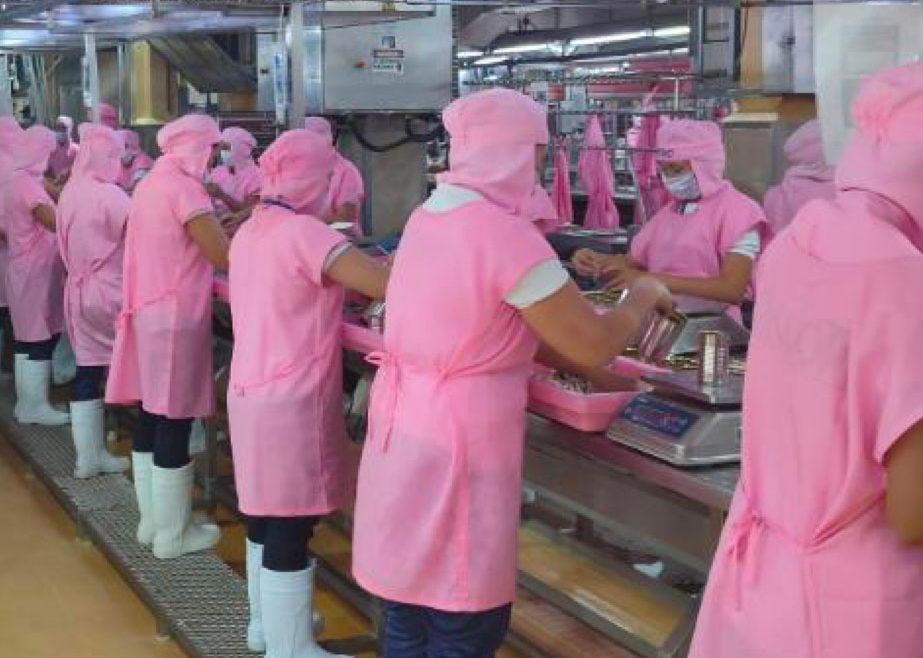
Factory workers at the General Santos facility of Century Pacific Food are front-liners, too. They observe all the safety protocols to avoid possible exposure to COVID-19.
While most people are working from their homes to avoid exposure to coronavirus disease and comply with lockdown orders, workers at manufacturing plants producing essential goods, especially food, do not have the luxury of taking a break. They have to run the factories to avoid disruption in the supply chain. But how is physical distancing implemented in factories?
At the manufacturing sites of Po family-led Century Pacific Food, the maker of tuna and sardines brands such as Century Tuna and 555, employees are required to wear appropriate masks and face shields at all times.
Foot markers across shop floors help workers maintain a safe distance from each other, based on the distance prescribed by the World Health Organization.
“We stand by our commitment to help ensure food security during the COVID-19 crisis by keeping our plant fully operational,“ said Gregory Banzon, executive vice president and chief operating officer of Century Pacific.
“At the same time, we have to make the welfare of our employees a top priority to sustain operations during the enhanced community quarantine period. We have also adopted a variety of actions for the health, safety and comfort of our employees.”
The company has vowed to strictly observe social distancing even if it means reduced production due to fewer workers, to protect the health and well-being of its employees and customers. Physical distancing is required in all key processes of production at the tuna and sardine plants in General Santos City and Zamboanga.
Century Pacific has reduced manpower in the main plant by around 30 percent. Operating hours are the same but it allows more breaks for periodic disinfection.
Before entering the plant, employees go through a strict daily screening, including temperature reading, disinfecting foot baths and hand-washing. Hand sanitizer dispensers are deployed all over the plant for sustained levels of disinfection throughout the work day.
Factory workers have their own version of protective personal equipment. They are provided with masks, hair nets and manufacturing gowns. Those who have to interact frequently with coworkers are given face shields, adding extra layers of protection for workers in the production lines.
Worker resting areas during breaks are also laid out to ensure proper social distancing. Employees living outside the immediate community can ride the company shuttle—one seat apart—to get to and from the factory.
The extra steps in ensuring plant worker safety is seen to add to the overall safety of the canned products brands of Century Pacific, where each can is also processed in high heat exceeding 120 degrees Celsius and under very strict quality standards.
On employee welfare, the company’s workers also receive assistance in the form of free canned goods for their families, free meals at the plant along with vitamin supplements to boost their immunity. Century Pacific was among the first to respond to the call for the release of the prorated portion of the 13th month pay.
“Our employees are the backbone of our operations and we need to keep an eye on their welfare, even more so during this global health crisis when we are doing our part in ensuring food security,” Banzon said.
Food and beverage giant San Miguel Corp.’s (SMC) chief Ramon Ang has repeatedly assured that there would be enough food for Filipinos to eat during the lockdown period.
SMC’s Ginebra San Miguel Inc. also recently retooled its liquor plants nationwide to produce rubbing alcohol to help medical front-liners in the war against the COVID-19 pandemic. The group also started producing nutribun-inspired breads for donation to poor communities severely affected by the quarantine.
In its production sites, strict guidelines for social distancing are observed. Wearing of face masks in and out of the workplace is mandated. Employees are asked to avoid close contact with anyone and maintain physical distance of at least six feet.
Employees are reminded to regularly clean hands with soap and water or 70 percent alcohol, as well as to clean their workspace before and after work.
For its part, D&L Industries has kept selected production lines operational during the lockdown to prevent any disruption in the supply of raw materials for the critical food and sanitation chemical industries.
To ensure social distancing, tape markers are placed on the floor where people need to line up. A distance of at least one meter is observed.
D&L has also implemented staggered attendance. Less than 25 percent of its workforce remains on duty during the lockdown period, D&L president Alvin Lao said.
“I believe that as a good corporate citizen, it is our responsibility to keep our employees safe and make sure there are no major disruptions in manufacturing raw materials used in basic food items and sanitation products that are crucial during these times. The food ingredients that we manufacture go into canned goods, noodles, biscuits and other shelf-stable snacks. We also manufacture sanitation chemicals such as alcohol, disinfectant spray and sanitizer, which are much needed due to current conditions,” Lao added.
D&L has moved large meetings to online platforms and constantly reminds its staff verbally and in internal groups. Staggered lunch breaks are implemented to avoid overcrowding at the eating areas.
The company manufactures customized food ingredients, specialty raw materials for plastics, and oleochemicals for personal and home care use. The company is also the manufacturer of Laurin CocoMCT, a coconut-derived immunity-boosting supplement rich in lauric acid that has antiviral and antibacterial properties. It also produces sanitation products such as Solbac disinfectant spray, Fresh Again alcohol and Bactofree sanitizer.

